if虚拟语气
虚拟语气

If it snowed/were to snow/should snow tomorrow,we could change our plan.
如果明天下雪,我们会改变计划。
将来
二、虚拟语气的倒装形式
1)If it had not been for your help,we would never have been able to get out of trouble. → Had it not been for your help,we would never have been able to get out of trouble. 2)If it should snow tomorrow,we would put off our trip. → Should it snow tomorrow,we would put off our trip. 3)If I were you,I would buy that car. → Were I you,I would buy that car.
他立刻去老师的办公室很有必要。
增:
现在的事实 If it were not for the fact that you are ill,I would ask you to do this right now.
如果不是你病了,我会让你立刻做这件事。
If he had followed my advice,he wouldn’t 过去 have lost his job.
如果他听了我建议,他不会失去他的 工作。
情况3:与将来事实相反
If sb. did/were to do/should do …,sb. would/could/might do.
高中英语if条件虚拟语气
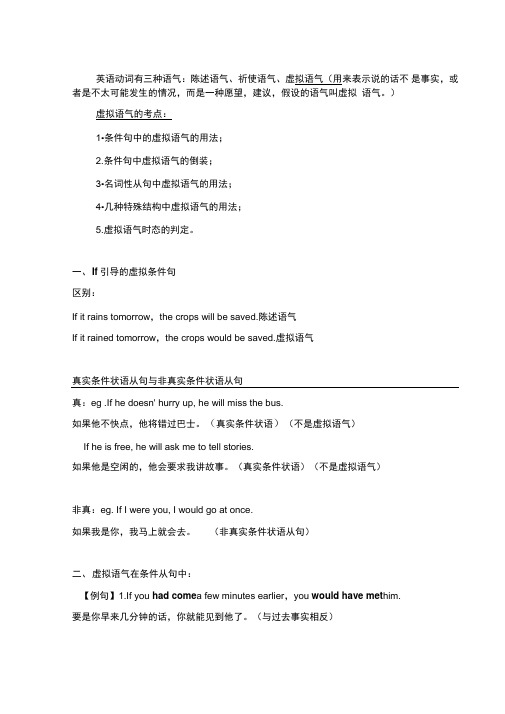
英语动词有三种语气:陈述语气、祈使语气、虚拟语气(用来表示说的话不是事实,或者是不太可能发生的情况,而是一种愿望,建议,假设的语气叫虚拟语气。
)虚拟语气的考点:1•条件句中的虚拟语气的用法;2.条件句中虚拟语气的倒装;3•名词性从句中虚拟语气的用法;4•几种特殊结构中虚拟语气的用法;5.虚拟语气时态的判定。
一、If引导的虚拟条件句区别:If it rains tomorrow,the crops will be saved.陈述语气If it rained tomorrow,the crops would be saved.虚拟语气真实条件状语从句与非真实条件状语从句真:eg .If he doesn' hurry up, he will miss the bus.如果他不快点,他将错过巴士。
(真实条件状语)(不是虚拟语气)If he is free, he will ask me to tell stories.如果他是空闲的,他会要求我讲故事。
(真实条件状语)(不是虚拟语气)非真:eg. If I were you, I would go at once.如果我是你,我马上就会去。
(非真实条件状语从句)二、虚拟语气在条件从句中:【例句】1.If you had come a few minutes earlier,you would have met him.要是你早来几分钟的话,你就能见到他了。
(与过去事实相反)2.lf it were sunny tomorrow, i would come to see you.明天要是天气好的话,我来看你。
(与将来事实可能相反)3.lf i were you, i would go at once.假如我是你的话,我会马上走。
(与现在事实相反,事实上我不可能是你)主从句的谓语形式(一)与现在事实相反的虚拟条件句表示与现在事实相反的情况,例 1.lf I were you, I would take an umbrella.如果我是你,我会带把伞。
(完整版)if引导的条件句中的虚拟语气
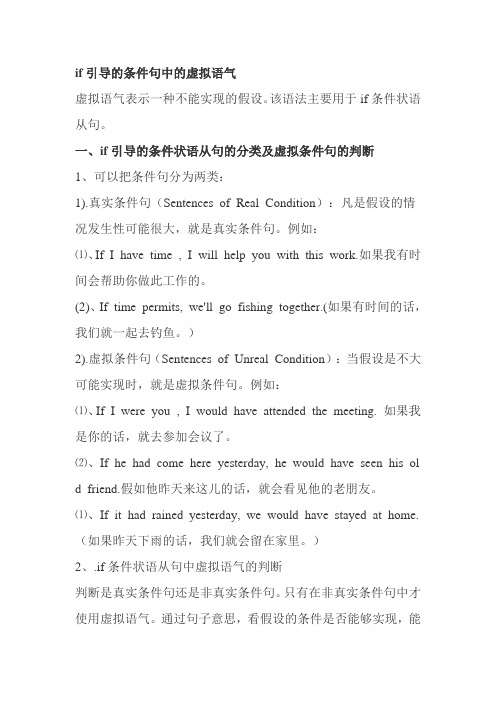
if引导的条件句中的虚拟语气虚拟语气表示一种不能实现的假设。
该语法主要用于if条件状语从句。
一、if引导的条件状语从句的分类及虚拟条件句的判断1、可以把条件句分为两类:1).真实条件句(Sentences of Real Condition):凡是假设的情况发生性可能很大,就是真实条件句。
例如:⑴、If I have time , I will help you with this work.如果我有时间会帮助你做此工作的。
(2)、If time permits, we'll go fishing together.(如果有时间的话,我们就一起去钓鱼。
)2).虚拟条件句(Sentences of Unreal Condition):当假设是不大可能实现时,就是虚拟条件句。
例如:⑴、If I were you , I would have attended the meeting. 如果我是你的话,就去参加会议了。
⑵、If he had come here yesterday, he would have seen his old friend.假如他昨天来这儿的话,就会看见他的老朋友。
⑴、If it had rained yesterday, we would have stayed at home.(如果昨天下雨的话,我们就会留在家里。
)2、.if条件状语从句中虚拟语气的判断判断是真实条件句还是非真实条件句。
只有在非真实条件句中才使用虚拟语气。
通过句子意思,看假设的条件是否能够实现,能够实现是真实条件句,不能使用虚拟语气;假设的条件不能实现则是非真实条件句,要用虚拟语气。
判断这个假设是与哪个事实相反。
通常有三种情况:①与过去事实相反。
②与现在事实相反。
③与将来事实可能相反。
3、“后退一步法”后退一步法是指在准确地判断了该句与哪一事实相反后,按虚拟语气的后退一步法处理从句谓语动词的时态。
if 条件句虚拟语气
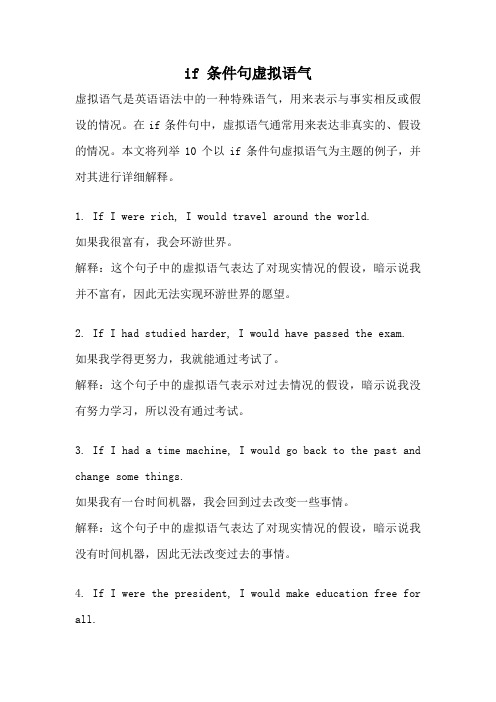
if 条件句虚拟语气虚拟语气是英语语法中的一种特殊语气,用来表示与事实相反或假设的情况。
在if条件句中,虚拟语气通常用来表达非真实的、假设的情况。
本文将列举10个以if条件句虚拟语气为主题的例子,并对其进行详细解释。
1. If I were rich, I would travel around the world.如果我很富有,我会环游世界。
解释:这个句子中的虚拟语气表达了对现实情况的假设,暗示说我并不富有,因此无法实现环游世界的愿望。
2. If I had studied harder, I would have passed the exam.如果我学得更努力,我就能通过考试了。
解释:这个句子中的虚拟语气表示对过去情况的假设,暗示说我没有努力学习,所以没有通过考试。
3. If I had a time machine, I would go back to the past and change some things.如果我有一台时间机器,我会回到过去改变一些事情。
解释:这个句子中的虚拟语气表达了对现实情况的假设,暗示说我没有时间机器,因此无法改变过去的事情。
4. If I were the president, I would make education free for all.如果我是总统,我会让教育对所有人免费。
解释:这个句子中的虚拟语气表达了对现实情况的假设,暗示说我并不是总统,所以无法实现让教育免费的目标。
5. If it didn't rain tomorrow, we could go hiking.如果明天不下雨,我们可以去远足。
解释:这个句子中的虚拟语气表达了对未来情况的假设,暗示说明天可能会下雨,所以无法去远足。
6. If I had known you were coming, I would have prepared a meal for you.如果我知道你要来,我会为你准备一顿饭。
if引导的条件句中的虚拟语气
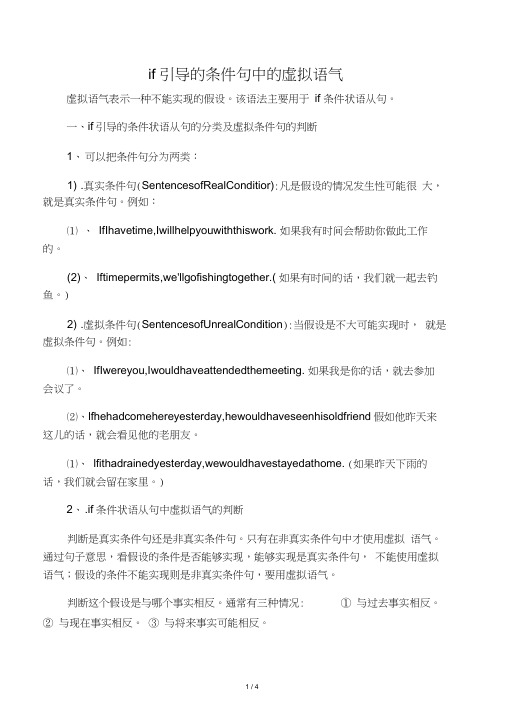
if 引导的条件句中的虚拟语气虚拟语气表示一种不能实现的假设。
该语法主要用于if 条件状语从句。
一、if引导的条件状语从句的分类及虚拟条件句的判断1、可以把条件句分为两类:1) .真实条件句(SentencesofRealConditior):凡是假设的情况发生性可能很大,就是真实条件句。
例如:⑴ 、IfIhavetime,Iwillhelpyouwiththiswork. 如果我有时间会帮助你做此工作的。
(2)、Iftimepermits,we'llgofishingtogether.( 如果有时间的话,我们就一起去钓鱼。
)2) .虚拟条件句(SentencesofUnrealCondition):当假设是不大可能实现时,就是虚拟条件句。
例如:⑴、IfIwereyou,Iwouldhaveattendedthemeeting. 如果我是你的话,就去参加会议了。
⑵、lfhehadcomehereyesterday,hewouldhaveseenhisoldfriend假如他昨天来这儿的话,就会看见他的老朋友。
⑴、lfithadrainedyesterday,wewouldhavestayedathome. (如果昨天下雨的话,我们就会留在家里。
)2、.if条件状语从句中虚拟语气的判断判断是真实条件句还是非真实条件句。
只有在非真实条件句中才使用虚拟语气。
通过句子意思,看假设的条件是否能够实现,能够实现是真实条件句,不能使用虚拟语气;假设的条件不能实现则是非真实条件句,要用虚拟语气。
判断这个假设是与哪个事实相反。
通常有三种情况: ① 与过去事实相反。
② 与现在事实相反。
③ 与将来事实可能相反。
3、“后退一步法后退一步法是指在准确地判断了该句与哪一事实相反后,按虚拟语气的后退一步法处理从句谓语动词的时态。
即:在非真实条件状语从句中,谓语动词按正常情况“后退一步”。
也就是:① 与过去事实相反,在从句中用过去完成时形式表示。
(完整版)if虚拟语气
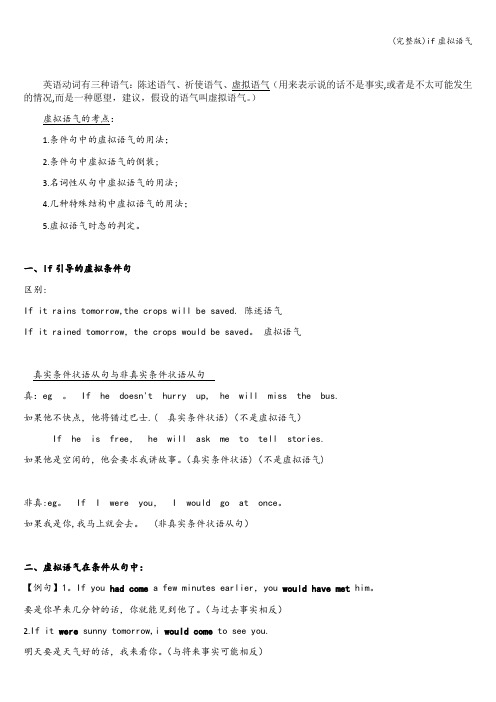
英语动词有三种语气:陈述语气、祈使语气、虚拟语气(用来表示说的话不是事实,或者是不太可能发生的情况,而是一种愿望,建议,假设的语气叫虚拟语气。
)虚拟语气的考点:1.条件句中的虚拟语气的用法;2.条件句中虚拟语气的倒装;3.名词性从句中虚拟语气的用法;4.几种特殊结构中虚拟语气的用法;5.虚拟语气时态的判定。
一、If引导的虚拟条件句区别:If it rains tomorrow,the crops will be saved. 陈述语气If it rained tomorrow,the crops would be saved。
虚拟语气真实条件状语从句与非真实条件状语从句真:eg 。
If he doesn't hurry up, he will miss the bus.如果他不快点,他将错过巴士.( 真实条件状语)(不是虚拟语气)If he is free,he will ask me to tell stories.如果他是空闲的,他会要求我讲故事。
(真实条件状语)(不是虚拟语气)非真:eg。
If I were you,I would go at once。
如果我是你,我马上就会去。
(非真实条件状语从句)二、虚拟语气在条件从句中:【例句】1。
If you had come a few minutes earlier,you would have met him。
要是你早来几分钟的话,你就能见到他了。
(与过去事实相反)2.If it were sunny tomorrow,i would come to see you.明天要是天气好的话,我来看你。
(与将来事实可能相反)3.If i were you,i would go at once.假如我是你的话,我会马上走.(与现在事实相反,事实上我不可能是你)主从句的谓语形式(一)与现在事实相反的虚拟条件句表示与现在事实相反的情况,例1。
If I were you, I would take an umbrella.如果我是你,我会带把伞。
if虚拟语气
如果我有翅膀,我就能飞。(我有翅膀 吗?)
if 引导的虚拟条件句
①与现在事实相反 ②与过去事实相反 ③与将来事实可能相反
虚基拟本语特气点可是以时主表态从示往过句后去推,的移现谓在。和语“将形后来的退式情一况步,时法态”的
时间
If 从句的谓语形式 主句的谓语形式
• c. would miss
d. missed
如果上天能够给我一个再来一次的机会, 我会对那个女孩子说三个字:我爱你。
If the God _s_h_o_u_ld__/w__er_e_t_o_g_i_ve_/_g_a_ve_____(give) me another chance,I__w_o__u_l_d_t_e_l_l__ the girl three words: I love her!
主语+would ( should / might / could ) +动词原形
主语 + would ( should / might / could ) +have done
主语+would ( should / might / could ) +动词原形
Thanks for your time!
• 1. If I ____ a map, I would lend it to you.
• a. have b. had c. should
• d. would
• 2. Alan _____ the party if he had gone to London.
• a. would have missed b. had missed
2. 我昨天要是有时间,我就和你一起去那了.
虚拟语气if的三种用法例句有什么
虚拟语气if的三种用法例句有什么三种情况,(1)对过去,从句had done主句would/could/might/have done(2)对现在,从句:did /were 主句:would/could/might do(3)对将来,should do/were to do/did.从句,更上一个一样。
注意,“主将从现”原则。
虚拟语气if的用法1、现在时:当if引导的虚拟语气表示与现在事实相反时,主句谓语用could、would、should或might 加动词原形,条件从句中的谓语用过去式。
如:If we walk faster,we can get there earlier.如果我们走快一点,就能早点到达那里。
2、过去时:当if引导的虚拟语气表示与过去事实相反时,主句谓语用could、would、should或might 加have再加动词原形,如:If I wear my clothes thicker,I won’t catch a cold.如果我把衣服穿厚点,就不会感冒了。
3、将来时:当if引导的虚拟语气表示与将来事实相反时,主句谓语用could、would、should或might 加动词原形,条件从句中的谓语用过去式。
如:If it rains tomorrow,will you go shopping?如果明天下雨,你还会逛街吗?虚拟语气if的结构1、表示与现在事实相反的情况:从句:If+主语+动词一般过去时(Be动词用were)。
主句:主语+ should/would/might/could+do。
2、表示与过去事实相反的情况:从句:If+主语+had+done。
主句:主语+should/would/might/could+have done。
3、表示与将来事实相反:从句:①if+主语+were to do。
②if+主语+should+do。
③if+主语+动词一般过去式(be动词用were)。
if虚拟语气用法
if虚拟语气用法虚拟语气(Subjunctive Mood)是英语中的一种语气,用于表示假设、建议、愿望、怀疑等非现实的情况。
在if虚拟语气用法中,通常有以下几种情况:1. 对现在或将来的假设:- 如果我是国王,我会做很多好事。
(If I were a king, I would do many good things.)- 如果我是你,我会去旅行。
(If I were you, I would travel.)2. 对过去的假设:- 如果我昨天赢了彩票,我就会买一辆新车。
(If I had won the lottery yesterday, I would have bought a new car.)- 如果我早点知道这个消息,我就不会错过那个会议了。
(If I had known this news earlier, I wouldn't have missed that meeting.)3. 建议、要求或命令:- 如果你能帮我一下,我会非常感激。
(If you could help me, I would be very grateful.)- 如果他不来参加会议,我们就取消吧。
(If he doesn't come to the meeting, let's cancel it.)4. 愿望、希望或遗憾:- 要是我能飞就好了。
(If only I could fly.)- 要是我昨天没生病就好了。
(If only I hadn't been sick yesterday.)5. 建议或要求某人做某事:- 如果你愿意的话,请帮我一个忙。
(If you would like to, please do me a favor.)- 如果他不介意的话,让他来参加我们的聚会吧。
(If he doesn't mind, let him come to our party.)。
if引导的条件句中的虚拟语气
if引导的条件句中的虚拟语气虚拟语气表示一种不能实现的假设。
该语法主要用于if条件状语从句。
一、if引导的条件状语从句的分类及虚拟条件句的判断1、可以把条件句分为两类:1).真实条件句(Sentences of Real Condition):凡是假设的情况发生性可能很大,就是真实条件句。
例如:⑴、If I have tim e , I will help you with this work.如果我有时间会帮助你做此工作的。
(2)、If time permits, we'll go fishing together.(如果有时间的话,我们就一起去钓鱼。
)2).虚拟条件句(Sentences of Unreal Condition):当假设是不大可能实现时,就是虚拟条件句。
例如:⑴、If I were you , I w ould have attended the meeting. 如果我是你的话,就去参加会议了。
⑵、If he had come here yesterday, he would have seen his old friend.假如他昨天来这儿的话,就会看见他的老朋友。
⑴、If it had rained yesterday, we would have stayed at home.(如果昨天下雨的话,我们就会留在家里。
)2、.if条件状语从句中虚拟语气的判断判断是真实条件句还是非真实条件句。
只有在非真实条件句中才使用虚拟语气。
通过句子意思,看假设的条件是否能够实现,能够实现是真实条件句,不能使用虚拟语气;假设的条件不能实现则是非真实条件句,要用虚拟语气。
判断这个假设是与哪个事实相反。
通常有三种情况:①与过去事实相反。
②与现在事实相反。
③与将来事实可能相反。
3、“后退一步法”后退一步法是指在准确地判断了该句与哪一事实相反后,按虚拟语气的后退一步法处理从句谓语动词的时态。
- 1、下载文档前请自行甄别文档内容的完整性,平台不提供额外的编辑、内容补充、找答案等附加服务。
- 2、"仅部分预览"的文档,不可在线预览部分如存在完整性等问题,可反馈申请退款(可完整预览的文档不适用该条件!)。
- 3、如文档侵犯您的权益,请联系客服反馈,我们会尽快为您处理(人工客服工作时间:9:00-18:30)。
If虚拟语气一、虚拟语气在条件句中的用法If引导出的条件句中使用虚拟语气时,表示所说的话是非真实的,是一种假设。
通常有三种情况,与现在事实相反;与过去的事实相反;与将来的事实相反。
1[/B]、[/B]if从句表示与想在的事实相反的假设时,从句的谓语动词用一般过去时([/B] be一般用[/B]were),主句用[/B]would/should/could/might+[/B]动词原形[/B][/B] If we had enough money, we would buy a computerIf I were you,I would take her advice.If places were a like,there would be little need for geographers.如果各个地方都一样,就不需要地理学家了。
Our life would be better if there were no examination.2[/B]、[/B]if[/B]从句表示与过去事实相反的假设时,从句的谓语动词用过去完成时,主语用[/B]would/should/could/might+have+[/B]过去分词[/B][/B]If I had worked harder at school,I would have got a better job.If he had know your address yesterday,he would have telephoned you.We might have arrived here eariler if we had taken a taxi.If it had not been for you help, I would have failed again.3[/B]、[/B]If[/B]从句表示与将来事实可能相反的假设时,从句的谓语动词用一般过去时,[/B]were to do[/B]或[/B]should+[/B]动词原形,主句用[/B]would/should/could/ might+[/B]动词原形[/B][/B]If it rained tomorrow,we would put off the sports meet.If he were to leave today,he would get there by Friday.If she should fail again,we would not blame her.【注】(1)有时从句假设过去,而主句假设现在,这时从句用过去完成时,而主句用would/sh ould/could/might+动词原形。
If he had taken my advice,he would be much better now.(2)if从句中如果有助动词had,should或were时,可以省略if,而从句使用倒装语序。
Had you not left so early,you might have missed the train.Were I to be young again,I would study medicine.Should we miss the train,we should have to wait an hour at the station.(3)有时候假设的情况不是以条件句的形式表示出来,而是用介词without,but for等或是用连词but,or,otherwise等方式来表示的。
Without you help,I woul dn’t have achieved so much,.But for your help,I would not have succeeded.We didn’t know his telephone number,otherwise we would have telephone hi m.一、虚拟语气在宾语从句中的用法1[/B]、动词[/B]wish[/B]后面的[/B]that[/B]从句中常用虚拟语气表示愿望。
如果表示现在的愿望,从句中过去时([/B]be[/B]动词用[/B]were[/B]);如果表示过去的愿望,从句中用过去完成时或[/B]would/should/could/might+have+[/B]过去分词;如果表示将来的愿望,从句中用[/B]would/should/could/might+[/B]动词原形。
[/B][/B]I wish I know his address.I wish you had written to him.I wish I could have slept longer this morning,but I had go get up and come to class.I wish you would stop asking silly questions.【注】虚拟语气有时用省略语气,只保留did,had,were,would,could等助动词。
“Have you found the answer to the question?”“I wish I had.”I can’t go to Anqing with you,but I wish I would.2[/B]、短语[/B]would rather[/B]后面的宾语从句中要使用虚拟语气表示愿望、后悔。
表示现在和将来的愿望时,从句中使用一般过去时;表示对过去事情后悔,从句中用过去完成时。
[/B][/B]I would rather you were happy.I would rather you came here this Saturday.I would rather I had seen the professor yesterday.I would rather you hadn’t blamed her the other day.3[/B]、表示“建议、要求、命令、决定”的动词(如[/B]suggest,propose,recommend, insist,order,demand,request,advise,command,decide,grant,require,urge[/B]等)后面的[/B]that[/B]从句中要用虚拟语气,谓语动词用“[/B]should+[/B]动词原形”,[/B]should[/B]可省略。
[/B][/B]She suggests that they(should) go there right away.The author proposed that TV(should) be turned off at least one hour every da y.The captain ordered that his man fire at the enemy.【注】suggest如作“暗示,表明”解释,其后的that从句中不可用虚拟语气;insist如作“坚持认为”时,其后的that从句中亦不可用虚拟语气The smile on his face suggested that he was satisfied with our work.The man insisted that he had never stolen the money.二、虚拟语气在主语从句、表语从句或同位语从句中的用法1、 [/B]在[/B]it is important/necessary/vital/essential/strange that...[/B]句型中用“[/B]should+[/B]动词原形”虚拟式。
[/B][/B]It is important that the meeting be postponed.It is necessary that she come here twice a week to help clean the room.It is strange that he should turn down my offer.2[/B]、在[/B]it is suggested/ required/ requested that...[/B]句型中用“[/B]shoul d+[/B]动词原形”虚拟式。
[/B][/B]3[/B]、句子的主语如果是表示“建议、要求、命令、决定”意义的名词,那么以[/B]that[/ B]引导的表语从句中用“[/B]should+[/B]动词原形”虚拟式。
[/B][/B]My idea is that we should think it over before accepting it.4[/B]、表示“建议、要求、命令、决定”意义的名词后面如果接[/B]that[/B]从句作同位语,那么同位语从句中用“[/B]should+[/B]动词原形”虚拟式。
[/B][/B]We all agreed to his suggestion that we should go to Susong for sightseeing. She gave the order that no one go out of the house after 10 o’clock.【注】上述从句中的should均可省略一、虚拟语气在状语从句中的用法1、 [/B]在[/B]as if/as though[/B]引导的状语从句中可使用过去时表示虚拟语气。
[/B] [/B]He speaks as if he were on the spot.She spoke to me as if I were deaf.This device operated as though it had been repaired.2、 [/B]在[/B]in case,for fear that,lest[/B]引导的目的状语从句中,常用“[/B]shoul d+[/B]动词原形”虚拟式。
[/B][/B]He left early in case he should miss the last train.I punished the child lest he should make the same mistake.3[/B]、在[/B]whether...or...[/B]引导出的让步状语从句中可用动词原形表示虚拟语气。
[/B][/B]Whether it be fine or not,we’ll go ahead with the football match.It doesn’t matter to me whether he succeed or fail.二、虚拟语气在其他情况中的用法1、 [/B]在[/B]it is (about/high) time (that) ...[/B]句式中,[/B]that[/B]从句中要用一般过去时表示虚拟语气。
